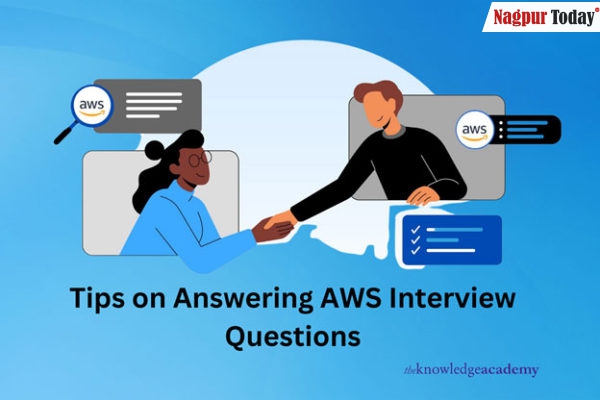
Navigating the AWS interview environment can be difficult, but you can confidently answer any question with the proper planning and comprehension of essential concepts. This blog offers professional advice on succeeding in AWS Interview Questions so you can differentiate yourself as a knowledgeable applicant. We will cover every aspect, from discussing practical situations and keeping up with new services to comprehending the AWS ecosystem and practising frequently asked questions.
AWS Courses can offer a comprehensive and organised method for understanding these ideas, making it ideal for individuals seeking to expand their knowledge.
Table of Contents
- Understand the AWS Ecosystem
- Review the AWS Well Architected Framework
- Practice Commonly Asked Questions
- Be Prepared to Discuss Real-World Scenarios
- Stay Updated with AWS Updates and New Services
- Understand Cost Management and Optimisation
- Highlight Your Understanding of Security Best Practices
- Practice Hands-On Labs and Exercises
- Communicate clearly and Confidently
- Prepare for Behavioral Questions
- Conclusion
Understand the AWS Ecosystem
Understanding the AWS ecosystem thoroughly is essential before answering specific interview questions. AWS [Amazon Web Services] provides many services, including machine learning, Internet of Things [IoT], storage and processing power. Learn about the fundamental services, including RDS [Relational Database Service], Lambda, S3 [Simple Storage Service] and EC2 [Elastic Compute Cloud]. Understanding these essential services will enable you to answer questions more confidently and accurately.
Review the AWS Well Architected Framework
The AWS Well-Architected Framework offers recommended practices for creating and managing dependable, safe, economical, and efficient cloud systems. Its five pillars are operational excellence, security, dependability, performance efficiency, and cost optimisation. Knowing this framework will help you efficiently create and manage AWS solutions and assist you in responding to technical questions.
Practice Commonly Asked Questions
A crucial component of your preparation is to rehearse frequently asked questions for AWS interviews. Here are a few instances:
What is AWS EC2, and how does it work?
A web service called EC2 [Elastic Computation Cloud] offers scalable computing capacity in the cloud. It enables users to start virtual servers and run programs on instances. Depending on your requirements, you may choose from various instance types, scale capacity up or down, and only pay for the computing time you use.
How does AWS S3 ensure data durability?
Data durability is ensured via AWS S3 [Simple Storage Service] which redundantly stores things on numerous devices across multiple AWS Region facilities. S3 durability is intended to be 99.999999999%. This implies that your data is protected and accessible even during hardware malfunctions.
Explain the difference between RDS and DynamoDB.
The managed relational database service known as RDS supports multiple database engines, including MySQL, PostgreSQL and Oracle. Applications requiring intricate data linkages and transactions can be used. Conversely, DynamoDB is a fully managed NoSQL database service focused on scalability and excellent performance. Applications requiring reliable, low latency data access should use it.
Be Prepared to Discuss Real-World Scenarios
Interviewers frequently use scenario based questions to gauge your aptitude for problem solving and practical understanding. Prepare to talk about actual situations in which you have used AWS solutions. As an illustration:
Give an example of a project where you resolved a business issue using AWS services.
Give specifics about the project, your difficulties, and how you employed AWS services to overcome those difficulties. Emphasise any cost reductions, increased security, or performance gains made possible by your solution.
Stay Updated with AWS Updates and New Services
AWS often adds new features and services. Keeping up with these upgrades demonstrates your dedication to lifelong learning and remaining up to speed with the industry. Stay updated on the newest advancements, read AWS blogs, attend webinars and participate in AWS events.
Understand Cost Management and Optimisation
AWS solutions cost management is essential. Interviewers may inquire about cost optimisation strategies that preserve security and performance. Be ready to talk about money-saving techniques like:
- To track and control expenses, use AWS Cost Explorer and Trusted Advisor.
- Putting savings plans and reserved instances into place for predictable workloads.
- Using Spot Instances for workloads that are flexible or non-critical.
Highlight Your Understanding of Security Best Practices
In cloud computing, security is top priority. You can distinguish yourself from other applicants by showcasing your familiarity with AWS security best practices. Be conversant with ideas like:
- Identity and Access Management or [IAM] manages user access.
- To manage incoming and outgoing traffic use Security Groups and Network ACLs.
- Putting encryption into practice for data in transit and at rest by utilising services like SSL and AWS KMS [Key Management Service].
Practice Hands-On Labs and Exercises
Having practical experience is quite helpful when getting ready for an AWS interview. Practice configuring and setting up services using the AWS Free Tier. Finish the labs and exercises on Cloud Guru and AWS Training and Certification websites. With this hands on expertise, you will be able to respond to technical inquiries more effectively and prove that you can use AWS services.
Communicate Clearly and Confidently
Communication skills are essential in an interview. Give a detailed explanation of your reasoning, the activities you took to solve a problem and the results of your decisions. Practise providing clear, confident replies to questions. Recall that the objective is to demonstrate your knowledge of the correct response and proficiency in explaining complex concepts.
Prepare for Behavioral Questions
Be prepared for behavioural questions that evaluate your cultural fit and soft abilities in addition to technical ones. For example, consider the following:
- Tell me about a moment when you encountered a complex technical issue. How did you resolve it?
- Give an example of a scenario in which you had to collaborate with others to accomplish a task.
Answers should be organised using the STAR [Situation, Task, Action, Result] technique to ensure clarity and conciseness.
Conclusion
Preparing for an AWS interview requires a combination of technical expertise, practical experience, and strong communication abilities. Understanding the AWS ecosystem, preparing for frequently asked questions, reviewing practical scenarios, keeping up with AWS innovations, and improving your soft skills will all help you seem good during interviews and land the job you want in cloud computing.
For a structured and comprehensive approach, consider the training offered by The Knowledge Academy to further enhance your skills and increase your chances of success.














